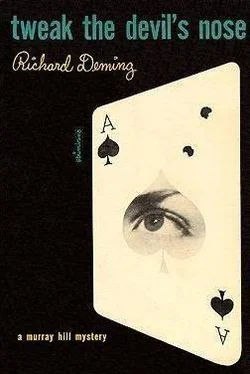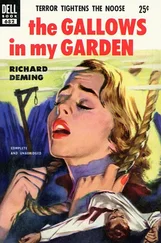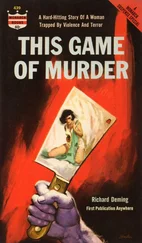Richard Deming - Tweak the Devil’s Nose
Здесь есть возможность читать онлайн «Richard Deming - Tweak the Devil’s Nose» весь текст электронной книги совершенно бесплатно (целиком полную версию без сокращений). В некоторых случаях можно слушать аудио, скачать через торрент в формате fb2 и присутствует краткое содержание. Город: New York, Год выпуска: 1953, Издательство: Rinehart, Жанр: Детектив, на английском языке. Описание произведения, (предисловие) а так же отзывы посетителей доступны на портале библиотеки ЛибКат.
- Название:Tweak the Devil’s Nose
- Автор:
- Издательство:Rinehart
- Жанр:
- Год:1953
- Город:New York
- ISBN:нет данных
- Рейтинг книги:5 / 5. Голосов: 1
-
Избранное:Добавить в избранное
- Отзывы:
-
Ваша оценка:
- 100
- 1
- 2
- 3
- 4
- 5
Tweak the Devil’s Nose: краткое содержание, описание и аннотация
Предлагаем к чтению аннотацию, описание, краткое содержание или предисловие (зависит от того, что написал сам автор книги «Tweak the Devil’s Nose»). Если вы не нашли необходимую информацию о книге — напишите в комментариях, мы постараемся отыскать её.
Tweak the Devil’s Nose — читать онлайн бесплатно полную книгу (весь текст) целиком
Ниже представлен текст книги, разбитый по страницам. Система сохранения места последней прочитанной страницы, позволяет с удобством читать онлайн бесплатно книгу «Tweak the Devil’s Nose», без необходимости каждый раз заново искать на чём Вы остановились. Поставьте закладку, и сможете в любой момент перейти на страницу, на которой закончили чтение.
Интервал:
Закладка:
Richard Deming
Tweak the Devil’s Nose
For Alys, who watched over my shoulder
1
There are two reasons I like El Patio Club as an occasional dining spot. It serves the finest food within a fifty-mile radius, and its proprietress is Fausta Moreni.
It is also the last place in the world you would expect to witness a murder, though this was not a factor in my preference when I passed up three alternate dining places I like in favor of El Patio on the July evening Walter Lancaster was assassinated.
Actually it had been the scene of a murder once before, but that was back in its days as a gambling casino, when its atmosphere was more conducive to homicide. Since Fausta had taken it over, eliminated the gaming tables and built it a reputation based on food, it had become the quietest supper club in town.
El Patio was originally named, I imagine, by someone who liked the sound of the words but knew no Spanish, for there is nothing within sight of it even faintly resembling a courtyard. It is a huge gray stone building of two stories, from the outside resembling a prison. But inside it is magnificent. Three enormous rooms run nearly the width of the building from front to rear. As you enter through the heavy bronze double doors (a holdover from its casino days when the place sometimes had to be barricaded against invading cops) you find yourself in a cocktail lounge so glittering you automatically brace yourself to pay double the normal rate for drinks.
To the left of the cocktail lounge an archway leads to the ballroom, where a five-dollar cover charge gets you a table, authorizes you to watch a floor show so sedate it would pass the scrutiny of a Methodist convention, and permits you to dance on a floor actually large enough to accommodate the usual crowd. It is the only night club I have ever been in which offers the twin innovations of entertainment, without smutty jokes and naked women, and sufficient room to dance.
To the right a similar archway leads to the dining room, billed by Fausta as “The Dining Place of Kings” ever since a deposed monarch stopped for a sandwich when he was motoring through the city a few years back. It is the dining room which brings Fausta her fortune. Not that she loses on either of the other rooms, for both draw as well as can be expected in a town which does not particularly go for night-club life. But seven nights a week the dining room is packed to the walls.
Yet oddly enough the club is out of the way and inconvenient to reach. Isolated in the center of a three-acre patch of ground at the extreme south edge of town, and on a secondary highway, you would hardly expect it to draw the crowds it does, for though its location was logical for a gambling casino, it is about as poor as can be imagined for a night club. But in this case the old adage about a better mousetrap worked out. Customers — not the fickle night-club crowd which makes new clubs boom the first month and then suddenly deserts for a new attraction, but a solid clientele which sticks year after year — book reservations weeks in advance and come from as far as fifty miles away to keep them.
I had no reservation, however, for when you start out for dinner as late as I did this particular night, you are not likely to have trouble finding a table anywhere. It was just nine thirty when I drove between the two stone pillars marking the entrance to El Patio’s drive. The drive, which runs past the club’s front entrance, then angles left alongside the building to a parking lot at the rear, separates El Patio from a heavily treed parklike area some hundred yards square. This area offered excellent cover to the assassin.
Had the taxi driver who pulled into the drive immediately ahead of me behaved as drivers familiar with the place do, possibly I would not have been involved in the murder at all, but apparently he was a new driver and did not know procedure. Instead of continuing back to the lot, turning around and returning to the entrance with his nose pointed toward the highway, he slammed on his brakes in front of the steps leading up to the bronze doors, jumped out and left his cab in the center of the drive, blocking traffic both ways.
Behind him I slammed on my own brakes just in time to avoid collision, then accidentally let my toe slip off the clutch, which caused the car to jolt forward and gently clang bumpers. This happened because I operate both foot pedals with my left foot, my right being an intricate contrivance of cork and aluminum below the knee.
Shortly after the war the Veterans Administration gave me a specially built Olds in return for the leg I left overseas, a sedan with the foot brake on the left and with an attachment which caused the clutch to disengage when the brake pedal was pushed halfway down. But when I finally traded it in on a 1951 Plymouth, I could not afford the special attachments. Consequently when I brake, I turn my left foot sidewise, hitting the brake with my heel and the clutch with my toe. I have gotten pretty good at it, but this time I slipped.
The cabbie, a cocky bantamweight with a strut like a Prussian sergeant major’s, stopped halfway up the steps, ran down again and anxiously stared at his undamaged bumper.
Then he inquired belligerently, “Whyn’t you learn how to drive?”
“Whyn’t you learn how to park?” I countered, mimicking his tone. “Pick either side of the drive you want and I’ll take the other.”
“Yeah?” he asked. “I gotta customer, Bud. I’ll move when I finish loading.”
As he started up the steps again, I got out of my car, swung open the driver’s door of the taxi and climbed in. The motor was running, and I had pulled the cab forward and to the right so that it was flush against the shrubbery edging the driveway before the cabbie realized what was happening.
“Hey!” he yelled, starting down again.
By the time he reached me I was out of the cab and had slammed the door. Near the left rear fender he stopped me by planting both hands on hips and halting directly in my path. He was only about five feet six and weighed possibly ninety-nine pounds, but his chin was thrust out and his expression said he could handle any two guys my size.
Grinning down at him, I tried to step around, but he moved his body to block me again. At the top of the steps I was conscious of the uniformed doorman watching this maneuvering with interest, and I began to grow a little irked. I suspected if I tried to push the bantam taxi driver aside, he would swing on me, and I had no desire to fight a man half my size. At the same time I do not enjoy being shoved around even by midgets.
I was saved from a decision by the big bronze doors opening and a man in white Palm Beach stepping out. Immediately the doorman clapped his hands and called, “Taxi for Mr. Lancaster!”
As the man descended the steps the little cabbie said darkly, “I’ll see you again, Buster,” and moved to open the rear door of the taxi.
I grinned at him again, took a step toward my own car just as the white-suited man passed between me and the cabbie, then half turned to glance back at the man as something familiar about his appearance struck me.
At that moment a gun roared so close to my ear it started bells ringing in my head.
The taxi driver, whose back had been turned while he opened the door, twisted around to gape at his customer. All three of us — the doorman, the taxi driver and I — stood transfixed as the man in white slowly spun around and collapsed on his face. The cabbie recovered first. He gave me a horrified look and dived in front of his cab out of the line of fire.
It did not occur to me at the moment that he thought I had fired the shot at him, missed and hit his customer.
Читать дальшеИнтервал:
Закладка:
Похожие книги на «Tweak the Devil’s Nose»
Представляем Вашему вниманию похожие книги на «Tweak the Devil’s Nose» списком для выбора. Мы отобрали схожую по названию и смыслу литературу в надежде предоставить читателям больше вариантов отыскать новые, интересные, ещё непрочитанные произведения.
Обсуждение, отзывы о книге «Tweak the Devil’s Nose» и просто собственные мнения читателей. Оставьте ваши комментарии, напишите, что Вы думаете о произведении, его смысле или главных героях. Укажите что конкретно понравилось, а что нет, и почему Вы так считаете.












